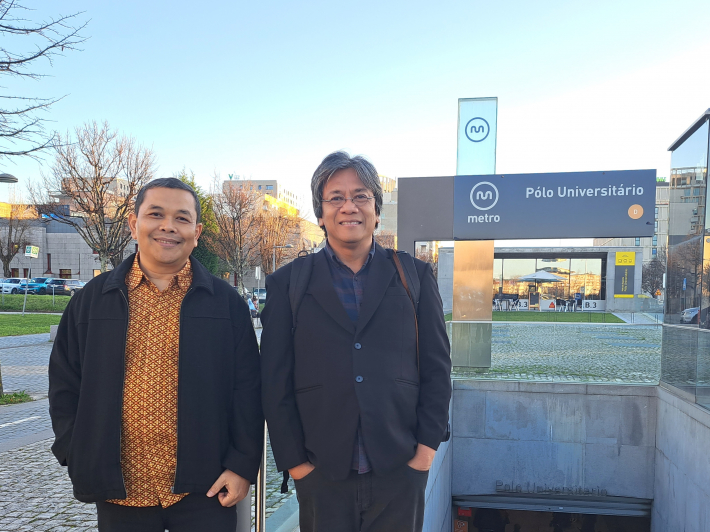NEWS
English Education Master’s Program Lecturers Attend CALOHEA International Research Meeting in Portugal

Two USD Master of English Language Education lecturers, namely FX. Ouda Teda Ena, Ed.D. and Paulus Kuswandono Ph.D., carrying out research activities in the city of Porto, Portugal. This research, with international funding from Erasmus+ (European Union), was carried out collaboratively with 13 countries in Asia with a theme that is very relevant to the need for quality assurance in higher education, namely Measuring and Comparing Learning Outcomes and Achievements for Higher Education in Asia (CALOHEA). This activity, which lasted for five days, was coordinated by the University of Groningen and an international quality assurance institution based in Thailand, namely AUN-QA (ASEAN University Network Quality Assurance).
This research project explores the implementation of the basic concepts of Student Workload (SWL) and Authentic Assessment (AuA) in higher education. Kuswandono explained, Student workload is a concept to ensure that students receive assignments in courses according to the estimated time calculation in accordance with the credit load and is explicitly written in the RPS.
"Student workload is very important so that students do not undertake studies that are too heavy in a course, causing burnout; or too light so that they do not present challenges and enthusiasm for learning. "It is very fundamental to fulfill this appropriate learning load so that the focus of learning continues to prioritize students' physical and mental well-being and fitness (student well-being) so as to reduce the symptoms of mental breakdown which many students and their parents often complain about," he explained.
Kuswandono further said that the concept of student workload cannot be separated from the implementation of authentic lecture assessments, which contain three dimensions.
"The first dimension, namely learning assessment which must be obtained from various sources, namely peers (peer-assessment), reflection of students' personal abilities (self-assessment), lecturers, as well as, for example, from the industrial/business world, schools, community communities. Second, the assessment model must represent the tasks, roles and types of graduate work that alumni will carry out later in real situations (real-life tasks). "And third, the type of assessment carried out to improve students' ability to collaborate, critically, communicate and be creative can be done through case study design, problem-based learning or projects," he said further.
This research activity is a multiyear research and has been carried out since January 2020 and will end in September 2024. Starting January 2024 – September 2024, CALOHEA USD researchers will report on the dissemination of research results, SWL and AuA workshops, poster publications on social media and websites, and also publications in research journals. The CALOHEA USD team consists of six lecturers from PBI, MPBI, and KBI, namely FX. Ouda Teda Ena, Ed.D., Paulus Kuswandono Ph.D., Veronica Triprihatmini, M.Hum., M.A., Caecilia Tutyandari, Ph.D., FX. Mukarto, Ph.D., and Christina Kristiyani, Ph.D. Through this dissemination program, all study programs at USD will be able to implement and develop some or all of the SWL and AuA implementation models effectively (PK & OTE).
- Student Workload Analysis of Master Program of English Education (MPEE)
- Thesis Examination Even Semester, April 2024
- English Education Master’s Program Lecturers Attend CALOHEA International Research Meeting in Portugal
- EEMP Semesterly Sharing Moments
- Admission 2024/2025
- Admission 2023 Batch 3 New Schedule
- Admission 2023 Batch 3
- Admission 2023 Batch 2
- Admission 2023 Batch 1
- Admission 2022 Batch 3